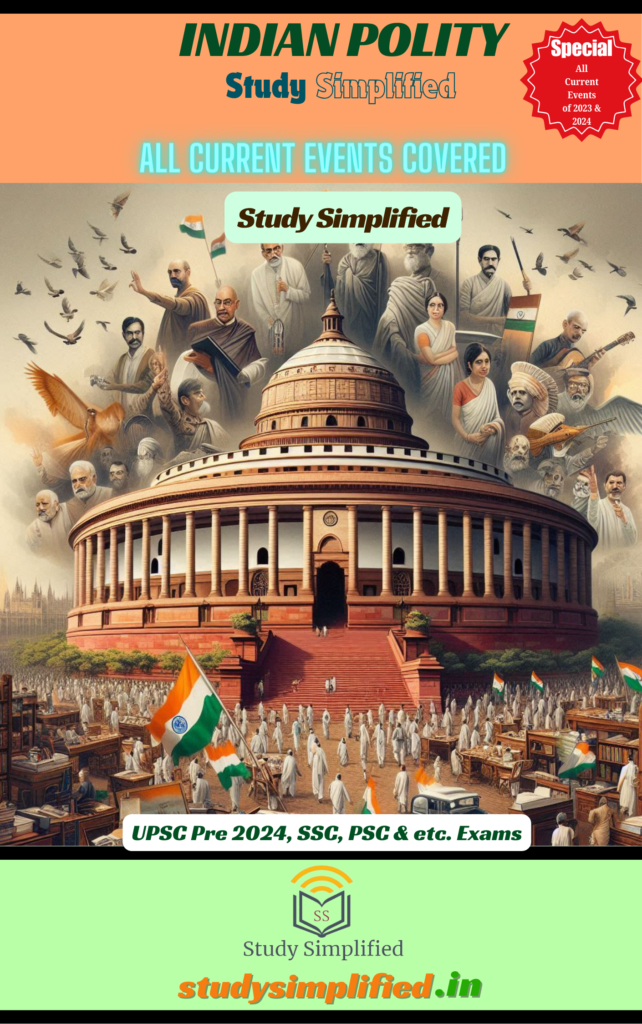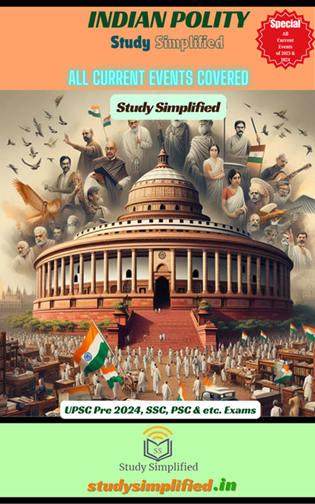Indian Polity is a crucial part of General Studies Paper 1 in the Civil Services IAS IPS Prelims Exam

About the Book Indian Polity Current Affairs
Introducing the must-have companion for aspirants preparing for UPSC, State PSC, SSC, and other competitive exams – “Mastering Indian Polity Current Affairs.”
- A comprehensive volume, a treasure trove of knowledge on Indian politics and governance
- Provides in-depth analysis of the latest developments, policies, and challenges shaping the nation’s political landscape
- Covers landmark judicial verdicts, legislative reforms, administrative restructuring, and global diplomatic relations
- Unique blend of theoretical concepts and practical applications
- Helps aspirants gain a solid understanding of fundamental principles and apply them in real-world scenarios
- Hones analytical and decision-making skills
- User-friendly layout, concise explanations, and a plethora of practice questions
- Comprehensive study guide that streamlines the preparation process
- Indispensable resource for UPSC, State PSC, SSC, and other competitive exams
- Equips aspirants with the knowledge and insights to navigate the complexities of Indian governance
- Must-have book to secure your path to success
Key Features of Indian Polity Current Affairs
Unveiling the ultimate guide to mastering Indian Polity Current Affairs – a comprehensive book tailored for aspirants preparing for UPSC, State PSC, SSC, and other competitive exams. This meticulously crafted volume offers an in-depth exploration of the following key areas:
- Issues Related to the Constitution:
– Detailed analysis of constitutional amendments, landmark judgments, and their implications
– Insights into contemporary debates on constitutional provisions and their interpretations
- Functioning of Parliament, State Legislatures, and Local Government:
– Comprehensive coverage of parliamentary proceedings, legislative processes, and reforms
– Examination of the roles, powers, and responsibilities of central and state legislatures
– Analysis of local self-governance mechanisms and their impact on governance
- Centre-State Relations:
– In-depth examination of federal dynamics, constitutional provisions, and evolving power equations
– Exploration of contentious issues, such as fiscal federalism, resource sharing, and regional autonomy
- Judiciary:
– Detailed discussion on judicial activism, landmark judgments, and their implications
– Analysis of the appointment process, judicial independence, and accountability mechanisms
- Elections:
– Comprehensive coverage of electoral processes, reforms, and the role of various stakeholders
– Insights into election management, voter behavior, and the impact of technology
- Important Legislations and Bills:
– Detailed analysis of significant bills, acts, and their potential impact on governance
– Examination of legislative intent, implementation challenges, and societal implications
This book offers a holistic and up-to-date understanding of Indian polity, incorporating the latest developments and trends. With its comprehensive coverage, insightful analysis, and extensive practice questions, it serves as an invaluable resource for aspirants seeking to excel in competitive exams and gain a deep understanding of the nation’s political landscape.
Importance of Reading Indian Polity Current Affairs
Reading Indian Polity Current Affairs is of utmost importance for aspirants preparing for UPSC, State PSC, SSC, and other competitive exams. Here are some key reasons why it is crucial:
- Comprehensive Understanding: The Indian Polity syllabus covers a wide range of topics, including the Constitution, Parliament, State Legislatures, Judiciary, Elections, and important legislations. Keeping up with current affairs related to these areas is essential for developing a comprehensive understanding of the subject.
- Relevance and Application: Current affairs help aspirants understand how theoretical concepts are applied in real-world situations. By studying current events, aspirants can grasp the practical implications of various policies, reforms, and judicial decisions, and their impact on governance and society.
- Updated Knowledge: The political landscape in India is highly dynamic, with frequent changes in laws, policies, and government initiatives. Reading current affairs ensures that aspirants have up-to-date knowledge, which is crucial for answering questions accurately in the examination.
- Analytical and Critical Thinking: Current affairs often involve complex issues, debates, and controversies. Analyzing these events helps aspirants develop analytical and critical thinking skills, which are essential for tackling case studies and opinion-based questions in the exam.
- Contemporary Perspectives: Competitive exams often include questions that test aspirants’ understanding of contemporary issues and their ability to provide informed opinions. Staying updated with current affairs equips aspirants with the necessary knowledge and perspectives to address such questions effectively.
- Holistic Preparation: While the static portion of the syllabus forms the foundation, current affairs provide the necessary context and relevance. Integrating current affairs into the preparation process ensures a holistic and well-rounded understanding of the subject matter.
- Scoring Advantage: Many competitive exams, including the UPSC Civil Services Examination, allocate a significant portion of marks to current affairs-related questions. Being well-versed in Indian Polity Current Affairs can provide aspirants with a scoring advantage over other candidates.
By consistently reading and analysing Indian Polity Current Affairs, aspirants can stay ahead of the curve, develop a comprehensive understanding of the subject, and enhance their chances of success in competitive exams.
Similar Posts on Current Affairs
ENVIRONMENT AND ECOLOGY Current Affairs 2024: https://studysimplified.in/environment-and-ecology-current-events/
Follow UPSC Website for Latest updates: https://upsc.gov.in/
